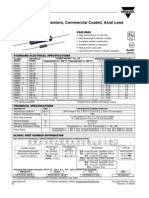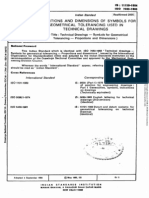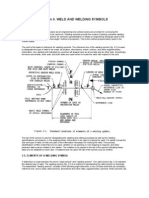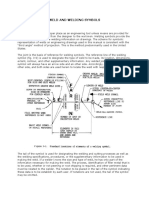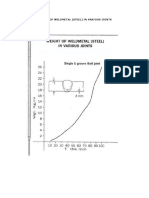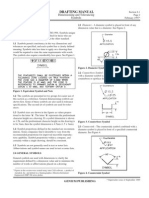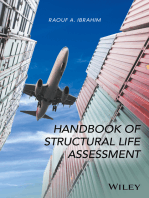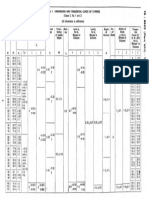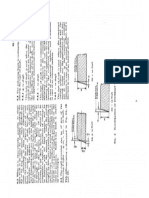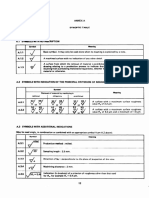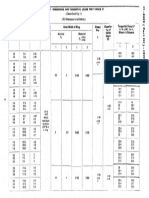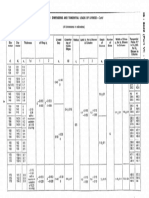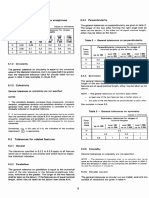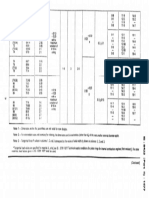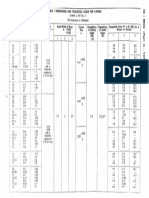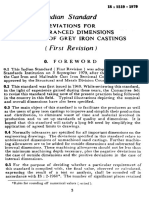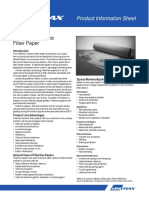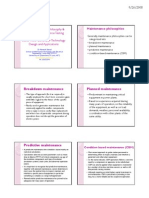Is 10719 (Iso 1302) - 14
Is 10719 (Iso 1302) - 14
Uploaded by
Svapnesh ParikhCopyright:
Available Formats
Is 10719 (Iso 1302) - 14
Is 10719 (Iso 1302) - 14
Uploaded by
Svapnesh ParikhOriginal Title
Copyright
Available Formats
Share this document
Did you find this document useful?
Is this content inappropriate?
Copyright:
Available Formats
Is 10719 (Iso 1302) - 14
Is 10719 (Iso 1302) - 14
Uploaded by
Svapnesh ParikhCopyright:
Available Formats
I$: 10719-1983
IS0 1302-1978
ANNEX B
PROPORTIONS AND DIMENSIONS OF SYMBOLS
In order to harmonize the sizes of the symbols specified in this International Standard with those of the other inscriptions on
the drawing (dimensions, tolerances, etc.) the following rules should be observed.
B.l GENERAL REQUIREMENTS
B.l.1 The symbols .(i.e. the basic symbol and its complements according to figures 1 to 4, and also the symbols for the
direction of lay shown in table 2) shall be inscribed with a line thickness (d’) equal to l/10 of the height (h) of the lettering
used for thedimensions in the relevant drawing.
B.1.2 The numerals and capital letters (and/or lower case letters) used for the additional specifications of surface texture
within the areas a,, a*, b, c(f) and e (see figures 14 and 37) shall be inscribed with the same line thickness (d), height (h) and
type of lettering as used for the dimensions in the relevant drawing, and in accordance with IS0 308B/l.1 )
8.1.3 The minimum spacing between adjacent lines shall never be less than twice the thickness of the heaviest line.
It is recommended that this spacing be not less than 0.7 mm.
B.2 PROPORTIONS
B-2.1 The basic symbol and its complements (see clause 3) shall be drawn in accordance with figures 27 to 30.
FIGURE 27 FIGURE 28 FIGURE 29 FIGURE 30
For dimensions d’, H, and H,, see clause 8.3.
The length of the horizontal stroke of the symbol in figure 30 depends upon that of the adjacent indications (see42 and A.3).
8.2.2 The symbols for indicating the direction of lay (see 4.3) shall be drawn as shown in figures 31 to 36.
The shape of the symbols in figures -33 to 36 is the same as that of the corresponding letters in IS0 3088/l (lettering B,
vertical).
FIGURE 31 FIGURE 32 FIGURE 33 FIGURE 34 FIGURE 35 FIGURE 36
For d.imensions d’ and h, see clause 8.3.
1) Owing to its largerspacing,lettering type A is superior to type I3 for reproduction and especially for microfilming. For this reason, lettering
We A is to be preferred for all lettering.
The difference in line thickness of the lettering (d) and that of the symbols td’) may be used as a means of distinguishing the two kinds of
inscriptions more clearly.
14
You might also like
- BS8888 DraftingDocument35 pagesBS8888 DraftingJonathan Lynch100% (6)
- M 3199-2 (2006-06)Document7 pagesM 3199-2 (2006-06)Hatada FelipeNo ratings yet
- Engineering Drawing: Sheet Layout Title Block Lettering DimensioningDocument29 pagesEngineering Drawing: Sheet Layout Title Block Lettering DimensioningpointNo ratings yet
- Iso 3098-5 (1997) PDFDocument8 pagesIso 3098-5 (1997) PDFsh0% (1)
- Anchor Audio Liberty MPB-4500 SchematicDocument3 pagesAnchor Audio Liberty MPB-4500 SchematicIgnacio Barriga Núñez0% (1)
- PHY102, Study Sheet, Cheat Sheet, EquationsDocument1 pagePHY102, Study Sheet, Cheat Sheet, EquationsTimothy StachowskiNo ratings yet
- GrpspecDocument11 pagesGrpspecdormenoNo ratings yet
- Is 11158 1984 ISO 7083 1983 Proportions and Dimensions of Symbols For Geometrical Tolerancing Used in Technical DrawingsDocument10 pagesIs 11158 1984 ISO 7083 1983 Proportions and Dimensions of Symbols For Geometrical Tolerancing Used in Technical DrawingsleovenuNo ratings yet
- ENGINEERING DROWING Chapter 2Document22 pagesENGINEERING DROWING Chapter 2DT artNo ratings yet
- 1.2.2 Types of Lines and Letters Part 2Document25 pages1.2.2 Types of Lines and Letters Part 2ethan philasia100% (1)
- Print Reading and Welding SymbolsDocument30 pagesPrint Reading and Welding Symbolsmega accountNo ratings yet
- Welding PDFDocument34 pagesWelding PDFSikandar HayatNo ratings yet
- Section I. Print Reading: 3-1. GENERALDocument34 pagesSection I. Print Reading: 3-1. GENERALSikandar HayatNo ratings yet
- Section 3 Structural Drawing For Detailing Table 3Document9 pagesSection 3 Structural Drawing For Detailing Table 3swatiNo ratings yet
- C DT 1Document4 pagesC DT 1Florin-Gabriel DumitricăNo ratings yet
- Section I. Print Reading: 3-1. GENERALDocument32 pagesSection I. Print Reading: 3-1. GENERALarnolhariNo ratings yet
- Engineering Drawing Week 03 Ee 215Document23 pagesEngineering Drawing Week 03 Ee 215Kumar SubramanianNo ratings yet
- Electronics Letters: Title Should Be: Submissions Template For No More Than 15 WordsDocument2 pagesElectronics Letters: Title Should Be: Submissions Template For No More Than 15 WordsHardik ModiNo ratings yet
- Acfrogcp0lniqizfmbxdzwt5ncbte9vsp7x As7hsuxtebsnb9pp Uo1hpqcn3i 9b s7bgvy-Aqohq2x2lural14m2-Bojmeohuiezvgth4xxhti91pwm1lqmufbpkwgiwxjbm3zcx9se9zw VDocument17 pagesAcfrogcp0lniqizfmbxdzwt5ncbte9vsp7x As7hsuxtebsnb9pp Uo1hpqcn3i 9b s7bgvy-Aqohq2x2lural14m2-Bojmeohuiezvgth4xxhti91pwm1lqmufbpkwgiwxjbm3zcx9se9zw Vcp118396No ratings yet
- Joining Welders Since 1995Document38 pagesJoining Welders Since 1995Sanjay Kumar SinghNo ratings yet
- Chapter 1Document64 pagesChapter 1Imran37AfiqNo ratings yet
- Weld and Welding Symbols: Er Latest Technology in The Widest Product Range, ComprDocument27 pagesWeld and Welding Symbols: Er Latest Technology in The Widest Product Range, ComprFYNo ratings yet
- Lecture 1 - Fundamentals of Engineering DrawingDocument31 pagesLecture 1 - Fundamentals of Engineering Drawingengidadereje100% (1)
- Texto International Standard Iso 3098-5 Cad Lettering - IsoDocument8 pagesTexto International Standard Iso 3098-5 Cad Lettering - IsoJorge Llimpe Rojas0% (1)
- Principles of Drawing : Material For This Chapter Has Been Taken From BIS SP-46: 1988Document33 pagesPrinciples of Drawing : Material For This Chapter Has Been Taken From BIS SP-46: 1988Sai MNo ratings yet
- PNS211Document5 pagesPNS211jbcast86No ratings yet
- Simboluri SuduriDocument32 pagesSimboluri SuduriGabriel MateiNo ratings yet
- Welding Symbol PDFDocument42 pagesWelding Symbol PDFDương HoàngNo ratings yet
- Teknik Resim StandartlariDocument4 pagesTeknik Resim StandartlarifatihNo ratings yet
- EG 01 Lettering PDFDocument10 pagesEG 01 Lettering PDFpvr2k1No ratings yet
- Weld and Welding Symbols: 3-4. GENERALDocument24 pagesWeld and Welding Symbols: 3-4. GENERALAnonymous D2GXdENo ratings yet
- Drafting Practice of Piping Drawings (General)Document68 pagesDrafting Practice of Piping Drawings (General)yulianus_sr100% (2)
- HTTP WWW - Welding.com Weld - Symbols - Welding - SymbolsDocument21 pagesHTTP WWW - Welding.com Weld - Symbols - Welding - Symbolsvmuthu76No ratings yet
- Welding SymbolsDocument37 pagesWelding Symbolsravirawat15No ratings yet
- BFT 113 Engineering DrawingDocument33 pagesBFT 113 Engineering DrawingSantheya RamanNo ratings yet
- HGS102 190 (1) EngDocument10 pagesHGS102 190 (1) Engjuniorferrari06No ratings yet
- Overview of An Engineering DrawingDocument25 pagesOverview of An Engineering Drawingmani88kctNo ratings yet
- Sif B31 3Document24 pagesSif B31 3vuqar0979100% (1)
- Welding Symbol 1Document3 pagesWelding Symbol 1Edo DestradaNo ratings yet
- Weight of Weldmetal (Steel) in Various JointsDocument194 pagesWeight of Weldmetal (Steel) in Various JointsmarathikathaNo ratings yet
- Paper Template IFireSS 2023Document4 pagesPaper Template IFireSS 2023jessycanunesNo ratings yet
- Basic Engineering DrawingDocument38 pagesBasic Engineering DrawingVignesh SelvarajNo ratings yet
- Machine Drawing Notes - 1Document20 pagesMachine Drawing Notes - 1N Dhanunjaya Rao BorraNo ratings yet
- Machining Symbol 1Document8 pagesMachining Symbol 1Prasanna RajaNo ratings yet
- Drafting ManualDocument8 pagesDrafting Manualanon_134141170No ratings yet
- Paper Size DrawingDocument6 pagesPaper Size DrawinggembulflowNo ratings yet
- ANSI (Edited)Document32 pagesANSI (Edited)khoirotun nisakNo ratings yet
- BS 1434 Copper For Electrical PurposesDocument14 pagesBS 1434 Copper For Electrical PurposesCristi Grosu0% (1)
- TVET 1 (Info. Sheet 5)Document7 pagesTVET 1 (Info. Sheet 5)John Lester GinoNo ratings yet
- Rebar ArrangmentDocument116 pagesRebar ArrangmentJesusBlasVitangcol100% (2)
- Sheet Metal Calculations: Bend AllowanceDocument10 pagesSheet Metal Calculations: Bend Allowancejim clarkNo ratings yet
- Composite Structures of Steel and Concrete: Beams, Slabs, Columns and Frames for BuildingsFrom EverandComposite Structures of Steel and Concrete: Beams, Slabs, Columns and Frames for BuildingsNo ratings yet
- Characteristic Modes: Theory and Applications in Antenna EngineeringFrom EverandCharacteristic Modes: Theory and Applications in Antenna EngineeringNo ratings yet
- Cylindrical Compression Helix Springs For Suspension SystemsFrom EverandCylindrical Compression Helix Springs For Suspension SystemsNo ratings yet
- Multivariate Density Estimation: Theory, Practice, and VisualizationFrom EverandMultivariate Density Estimation: Theory, Practice, and VisualizationRating: 4 out of 5 stars4/5 (1)
- Is 12308-8 - 1997 - 5Document1 pageIs 12308-8 - 1997 - 5Svapnesh ParikhNo ratings yet
- Is 10719 (Iso 1302) - 5Document1 pageIs 10719 (Iso 1302) - 5Svapnesh ParikhNo ratings yet
- Is 8422-8 - 1977 - 2Document1 pageIs 8422-8 - 1977 - 2Svapnesh ParikhNo ratings yet
- Is 12308-7 - 1991 - 3Document1 pageIs 12308-7 - 1991 - 3Svapnesh ParikhNo ratings yet
- Is 12308-6 - 1991 - 5Document1 pageIs 12308-6 - 1991 - 5Svapnesh ParikhNo ratings yet
- Is 10719 (Iso 1302) - 1Document1 pageIs 10719 (Iso 1302) - 1Svapnesh ParikhNo ratings yet
- Is 12308-8 - 1997 - 3Document1 pageIs 12308-8 - 1997 - 3Svapnesh ParikhNo ratings yet
- Is 11166 - 1993 - 10Document1 pageIs 11166 - 1993 - 10Svapnesh ParikhNo ratings yet
- Is 10719 (Iso 1302) - 12Document1 pageIs 10719 (Iso 1302) - 12Svapnesh ParikhNo ratings yet
- Is 12308-3 - 1987 - 1Document1 pageIs 12308-3 - 1987 - 1Svapnesh ParikhNo ratings yet
- Is 10719 (Iso 1302) - 4Document1 pageIs 10719 (Iso 1302) - 4Svapnesh ParikhNo ratings yet
- Is 12308-5 - 1991 - 3Document1 pageIs 12308-5 - 1991 - 3Svapnesh ParikhNo ratings yet
- Is 10719 (Iso 1302) - 8Document1 pageIs 10719 (Iso 1302) - 8Svapnesh ParikhNo ratings yet
- Is 8422-3 - 1977 - 2Document1 pageIs 8422-3 - 1977 - 2Svapnesh ParikhNo ratings yet
- Is 8422-6 - 1977 - 4Document1 pageIs 8422-6 - 1977 - 4Svapnesh ParikhNo ratings yet
- Is 2102-2 (Iso 2768-2) - 4Document1 pageIs 2102-2 (Iso 2768-2) - 4Svapnesh ParikhNo ratings yet
- Is 8422-2 - 1977 - 6Document1 pageIs 8422-2 - 1977 - 6Svapnesh ParikhNo ratings yet
- Is 8422-3 - 1977 - 1Document1 pageIs 8422-3 - 1977 - 1Svapnesh ParikhNo ratings yet
- Is 8422-3 - 1977 - 3Document1 pageIs 8422-3 - 1977 - 3Svapnesh ParikhNo ratings yet
- Is 2102-2 (Iso 2768-2) - 1Document1 pageIs 2102-2 (Iso 2768-2) - 1Svapnesh ParikhNo ratings yet
- Is 2102-2 (Iso 2768-2) - 3Document1 pageIs 2102-2 (Iso 2768-2) - 3Svapnesh ParikhNo ratings yet
- Is 8422-1 - 1977 - 5Document1 pageIs 8422-1 - 1977 - 5Svapnesh ParikhNo ratings yet
- Is 8422-2 - 1977 - 3Document1 pageIs 8422-2 - 1977 - 3Svapnesh ParikhNo ratings yet
- Is 5519 - 2Document1 pageIs 5519 - 2Svapnesh ParikhNo ratings yet
- Is 8422-1 - 1977 - 2Document1 pageIs 8422-1 - 1977 - 2Svapnesh ParikhNo ratings yet
- Is 5519 - 9Document1 pageIs 5519 - 9Svapnesh ParikhNo ratings yet
- Is 2102-2 (Iso 2768-2) - 5Document1 pageIs 2102-2 (Iso 2768-2) - 5Svapnesh ParikhNo ratings yet
- Is 2102-2 (Iso 2768-2) - 2Document1 pageIs 2102-2 (Iso 2768-2) - 2Svapnesh ParikhNo ratings yet
- Is 2102-2 (Iso 2768-2) - 8Document1 pageIs 2102-2 (Iso 2768-2) - 8Svapnesh ParikhNo ratings yet
- Is 5519 - 4Document1 pageIs 5519 - 4Svapnesh ParikhNo ratings yet
- Recurring Phase of Cycle Analysis_John EhlersDocument8 pagesRecurring Phase of Cycle Analysis_John EhlersTrader CatNo ratings yet
- LAb Report 1Document2 pagesLAb Report 1Faisal MumtazNo ratings yet
- I Questions: Subject Code BTCE-503Document3 pagesI Questions: Subject Code BTCE-503strangeNo ratings yet
- STMicroelectronics SM6T15CA Datasheet PDFDocument6 pagesSTMicroelectronics SM6T15CA Datasheet PDFDerviş CalkuNo ratings yet
- Adi C 3 12Document24 pagesAdi C 3 12fordelso4426No ratings yet
- ACB Split Bearing and Housing For Sugar Mill Drive 2013Document42 pagesACB Split Bearing and Housing For Sugar Mill Drive 2013Carlos E RuizNo ratings yet
- Fiberfrax Ceramic Fiber Paper: Product Information SheetDocument4 pagesFiberfrax Ceramic Fiber Paper: Product Information SheetbowoNo ratings yet
- Lesson PlanDocument4 pagesLesson PlanRichie BlasabasNo ratings yet
- Diagonalization MatrixDocument30 pagesDiagonalization Matrixkhatua.deb87No ratings yet
- Science 7: Lataban National High SchoolDocument1 pageScience 7: Lataban National High Schoolangelie lutaoNo ratings yet
- Generator Maintenance Testing 6 Slides Per PageDocument11 pagesGenerator Maintenance Testing 6 Slides Per Pageashwani2101100% (1)
- Chapter 1 MixtureDocument13 pagesChapter 1 MixtureWoon HowNo ratings yet
- Solved ExamplesDocument13 pagesSolved ExamplesTiee TieeNo ratings yet
- May 2-DLPDocument3 pagesMay 2-DLPAndrea Jarani LinezoNo ratings yet
- The 3 M Wide (Into The Page) Gate Shown in The Figure Is Hinged at Point H. Calculate The Force Required at Point A To Hold The Gate ClosedDocument2 pagesThe 3 M Wide (Into The Page) Gate Shown in The Figure Is Hinged at Point H. Calculate The Force Required at Point A To Hold The Gate ClosedKkkk PpppNo ratings yet
- Geomorphology: Natasha Pollen-Bankhead, Andrew SimonDocument10 pagesGeomorphology: Natasha Pollen-Bankhead, Andrew SimonGazza AmrNo ratings yet
- Report On PC Control Using TV RemotDocument37 pagesReport On PC Control Using TV RemotKeyur Patel67% (3)
- Microstructural and Mechanical Characterisation of 7075 Aluminium Alloy Consolidated From A Premixed Powder by Cold Compaction and Hot ExtrusionDocument10 pagesMicrostructural and Mechanical Characterisation of 7075 Aluminium Alloy Consolidated From A Premixed Powder by Cold Compaction and Hot ExtrusionsateeshNo ratings yet
- Firealarm PDFDocument52 pagesFirealarm PDFგიორგი მოდებაძეNo ratings yet
- Shrinkage Limit TestDocument4 pagesShrinkage Limit Testnz jumaNo ratings yet
- Trigonometric SubstitutionDocument7 pagesTrigonometric SubstitutionNazifullah KakarNo ratings yet
- 9e1a PDFDocument12 pages9e1a PDFvesselNo ratings yet
- RF-SG-G-3 Vol 1Document132 pagesRF-SG-G-3 Vol 1Anuj DeoNo ratings yet
- Electrmech ValveDocument12 pagesElectrmech ValvelakshmanantNo ratings yet
- Neet Physics Sample Question PaperDocument5 pagesNeet Physics Sample Question PaperMounika RavadaNo ratings yet
- Review Article: Thermal Load in Large-Scale Bridges: A State-of-the-Art ReviewDocument17 pagesReview Article: Thermal Load in Large-Scale Bridges: A State-of-the-Art ReviewPedro Juan Cavadia Ibañez PJNo ratings yet
- Generator Model Extension For Higher Accuracy Simulation of Powe 2017Document7 pagesGenerator Model Extension For Higher Accuracy Simulation of Powe 2017Fernando SalinasNo ratings yet
- Asq - Cqi BokDocument5 pagesAsq - Cqi BokImpaladinNo ratings yet





